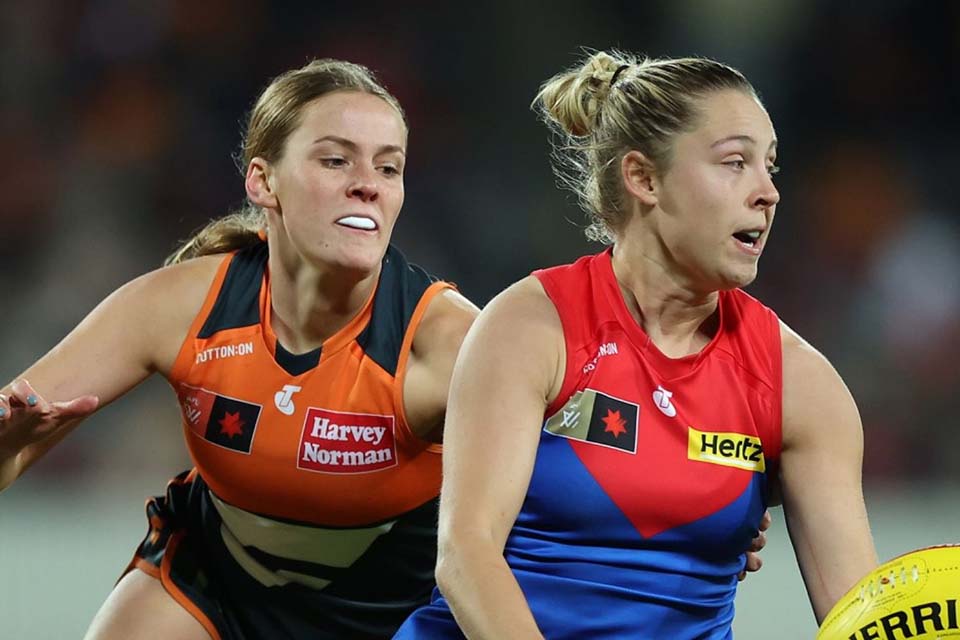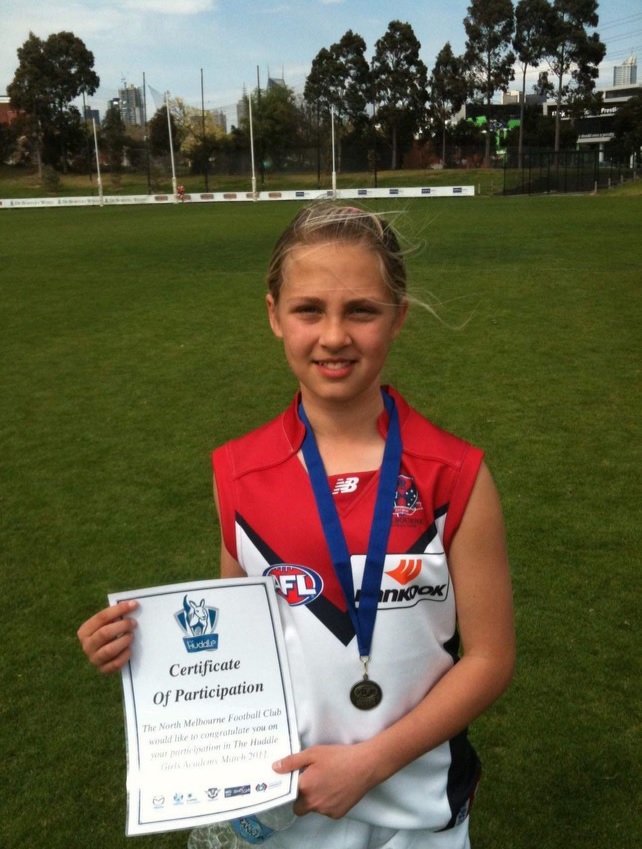Tyla Hanks leads the evolution of the AFLW
The Melbourne vice-captain is leading a generation of AFLW players who grew up playing footy at venues made for them, helping transform the standard of the sport on and off the field.

Looking at any of the AFLW’s 8 foundation clubs in 2017, you would have found players known for their skills on the netball court or hockey pitch than the footy field.
When the AFL embarked on a professional women’s competition 6 years ago, many of the players came from other sports who were forced out of football as teenagers due to lack of teams and leagues.
Current Melbourne vice-captain and 2021 AFL Women’s Rising Star winner Tyla Hanks described arriving at the Melbourne Demons as an 18-year-old draftee with more football experience than teammates 10-years or more her senior.
’When I first got drafted, I was playing with people aged 30 plus, and I almost had more experience than some experienced athletes in the team.
‘That was a really interesting dynamic because in the past there were a lot of people coming from other sports and different backgrounds.’
Now 23 years old, lack of opportunities while a teenager saw the star midfielder nearly forced away from footy and onto the basketball court.
When AFLW was announced I was playing basketball. I’d actually sort of stopped even having any interest in footy because I just thought there will be no pathway.
Tyla Hanks
Aside from lack a potential pathways to an elite competition, Tyla and players her age faced a lack of gender-neutral facilities, playing in boys' teams at venues built for men’s football.
‘When I was a junior, starting with the boys and not having access to anything else. I was a junior sharing changerooms and all sorts of things with boys and had to live that life.’
Thankfully for Tyla and thousands of female footballers across Victoria, that has rapidly changed.
Working with the AFL, the Victorian Government is helping transform the sport with better facilities at all levels, leading to an explosion of female teams and pathways from the grassroots to the elite level.
Draftees are now entering the league with a full junior career under their belt.
Tyla began excelling at the junior level right as this transformation was taking place.
‘I played footy all the way up until about 13 or 14 with boys when I had to stop and then my age group was the first age group where you could transition to a girls’ team.

Although it’s been a slow build, the change helped her maintain a passion for football and eventually led her to be drafted at Pick 6 by Melbourne in 2018.
‘I started at Gippy (Gippsland Power Under 18’s team) and we had a really good facility there, but the access I’ve had over the last six years of my AFLW career, from when we started in my first season, there we so many gaps in what we needed and what we had.
‘Now we have so many opportunities to get what we need and there’s just so much happening. The access we’ve had to better grounds and better facilities has improved heaps.’
The Victorian Government has been a strong supporter of growing the women’s game prior to the AFLW’s inaugural season in 2017.
With the support of more than $100 million in government investment, AFLW players across all 10 Victorian clubs will be able to utilise elite facilities across the state.
One of those elite facilities is Casey Fields, the home of the Demons, and where Tyla hones the skills that helped her earn a litany of awards including All Australia squad selection, the NAB AFLW Rising Star and a premiership medallion in 2022.
‘We love Casey and what a great facility that is for us.’
Casey Fields received $5 million of funding in the 2018/19 budget to lift the facility to an AFLW standard for training and matches.
Tyla can’t overstate how important these venues are to helping grow and improve the competition.
‘The venues have such a huge impact on it (standard of the game). Just for the game, the quality of a ground that you’re playing on can really impact on how well you play and how you can move the ball.
‘We’ve got GMHBA, we’ve got Ikon Park, we’ve played a few games on the MCG and Marvel when it’s been available. The quality of the venue, what it is for the crowd and what it is for the players is really important.’
Both Kardinia Park Stadium, known as GMHBA Stadium and Ikon Park have received Victorian Government investment for developments, improving access for teams across the AFLW. The $142 million Kardinia Park Stadium Stage 5 Redevelopment will complete the remarkable transformation of Australia’s premier regional venue.
A $20 million investment from the Victorian Government has transformed Ikon Park into a stunning high-performance sporting facility for men and women.
For Tyla it means elite facilities for herself and her Melbourne teammates which are striving to defend their premiership of last season.
A premiership defence is the grand prize, but Tyla has plenty of other things driving her this season.
“Individually I’m making sure I’m clear on my role and I’m really lucky to be vice-captain this year so there’s a bit more responsibility. I want to make sure I’m a good leader amongst the group and I can be a good teammate all the time.”
Tyla is helping drive the change in the AFLW and the Victorian Government will continue to be passionate, continue to drive change and continue to support the growth of women’s sport.